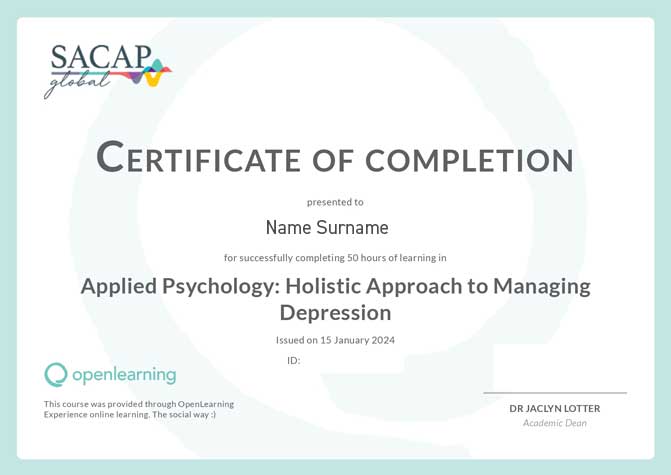Holistic Approach to Managing Depression
R3,500.00

Course Overview
Depression is a mood disorder that can affect how you feel, think, and behave and it can decrease your ability to function at work and home.
The Holistic Approach to Managing Depression short course explores the intricate landscape of depression.
This 50-hour course provides a holistic understanding of depression by examining its historical roots, societal impact, and the role of cultural influences.
Whether you are grappling with depression and looking to enhance your well-being or want to provide support to others dealing with depression, this short course will equip you with practical tools and knowledge to effectively address and manage depression.
The course starts by defining depression, unravelling its symptoms, and delving into the Diagnostic and Statistical Manual of Mental Disorders (DSM) perspective. This will allow you to gain insight into various types of depression and the critical threshold when it transforms from a set of symptoms into a recognised disorder.
Move on to investigate the origins of depression and consider biological, psychological, and environmental factors while addressing cultural influences, high-risk groups, and the pervasive stigma around mental health. Gain a better understanding of the diagnosis process and the immediate steps post-diagnosis.
The course navigates through diverse aspects of mental well-being, commencing with mindfulness practices such as breath awareness to enhance self-awareness and mental integration.
Finally, positive psychology principles are reflected upon, emphasising the creation of personal mission statements and the understanding of one’s strengths. Gratitude journaling emerges as a proactive tool to counteract depressive tendencies, while the role of exercise, sleep, and nutrition in helping overcome depression is explored.
NOTE: This course does not replace therapy but offers valuable supplementary insights, ensuring participants leave with a profound understanding of depression, practical tools for daily management, and the knowledge to support themselves and others on the journey towards mental well-being.
FAQs
What are the entry requirements?
Anyone 18 years of age or older can sign up for this short course. There are no academic entry requirements or conditions.
Who is this short course for?
This short course is for anyone interested in understanding depression.
What is the time commitment?
A total of 50 hours is required to complete the short course.
What do you need to do the short course?
- Access to Microsoft Word
- Google Chrome (recommended)
- Stable internet connection
Is the short course accredited?
The short course is not accredited and non-credit bearing.
What is depression?
Depression is a mood disorder that causes a persistent feeling of sadness and loss of interest in activities you once enjoyed. During a depressive episode, a person experiences a depressed mood that can be described as feeling sad, irritable, and empty. There are different types of depression and symptoms can be mild, moderate, or severe. Read more here.
Course highlights

-
Understand the historical roots, societal impact, and the role of cultural influences on depression.
-
Explore mindfulness practices, positive psychology principles, gratitude journaling, and the role of exercise, sleep, and nutrition.
-
Understand the diagnosis process and the role that professional therapy and medication play in managing depression.
Dates and Registration
- Class of 2025 Jul-Sep: 1 July – 30 September
- Class of 2025 Oct-Dec: 1 October – 31 December
Short course classes are on demand allowing you to register at any time and move through course content at a time that suits you. Learners will have access to the course for the class period they choose when registering.
Learner Experience
Certification
Upon completion, you will receive a digital certificate of completion as evidence of the skills and knowledge demonstrated.

The Holistic Approach to Managing Depression short course has been designed and developed by experts in the field of psychology. The course is for anyone needing to upskill in this area and offers 50 hours of learning.
What You’ll Learn
Through videos, readings and discussions, you will explore the following topics:
- The fundamental aspects of depression: defining depression, unravelling its symptoms, and delving into the Diagnostic and Statistical Manual of Mental Disorders (DSM) perspective.
- Gain insights into various types of depression and the critical threshold when it transforms from a set of symptoms into a recognised disorder.
- Investigate the origins, and consider biological, psychological, and environmental factors while addressing cultural influences, high-risk groups, and the pervasive stigma around mental health.
- A guide through the diagnosis process; discussing who can diagnose depression and the immediate steps post-diagnosis.
- Navigate through diverse aspects of mental well-being, commencing with mindfulness practices such as breath awareness.
- Understand how the transformative Wheel of Awareness guides individuals through various facets of consciousness to enhance self-awareness and mental integration.
- Positive psychology principles are reflected upon, emphasising creating personal mission statements and understanding one’s signature strengths.
- Gratitude journaling as a proactive tool to counteract depressive tendencies, while the role of exercise, sleep and nutrition in helping overcome depression is explored.
Course Outcomes
By the end of this course you will be able to:
- Define depression and describe the common symptoms.
- Discuss the orientation of the DSM towards depression.
- Identify different types of depression and when depression becomes a disorder.
- Explain the diagnostic process and understand the initial steps after a diagnosis.
- Define the historical origins of depression.
- Analyse the at-risk groups for depression with the correlating factors that make them at-risk.
- Investigate the importance of having a social support system.
- Discuss the stigma around mental health.
- Implement mindful practices in dealing with depression.
- Describe positive psychology principles aimed at increasing happiness.
- Identify the social support network systems needed.
- Recognise the role of professional therapy and medication.
The Team
The SACAP Global team brings a wealth of knowledge and practical experience across various disciplines. Our expert short course developers and dedicated support team are passionate about sharing their insights to help you get the most out of your online learning journey.





















